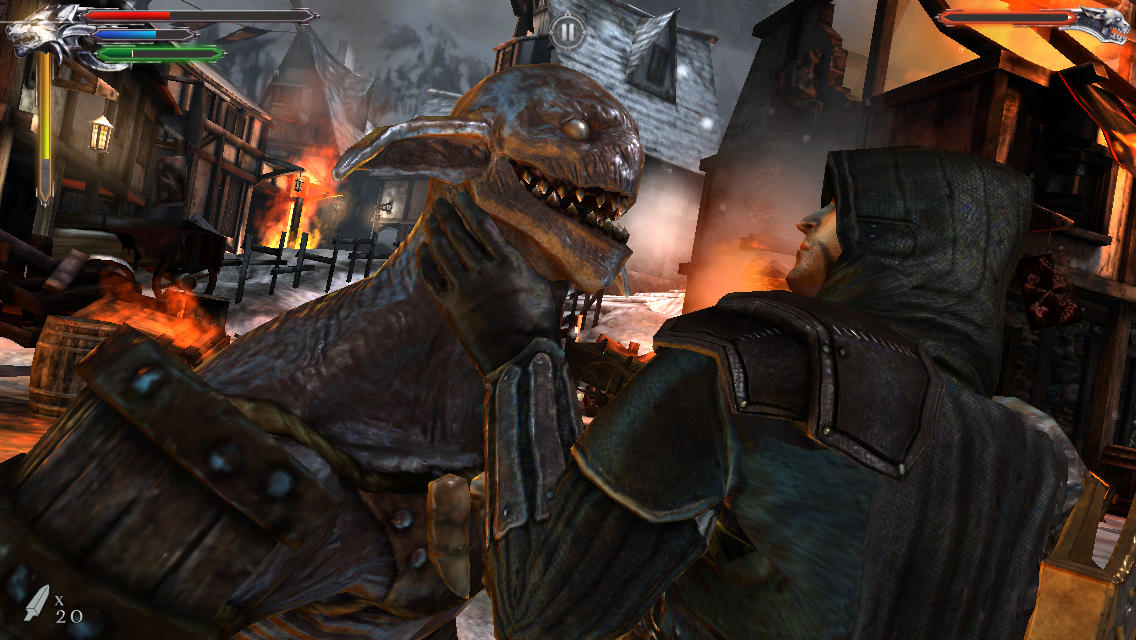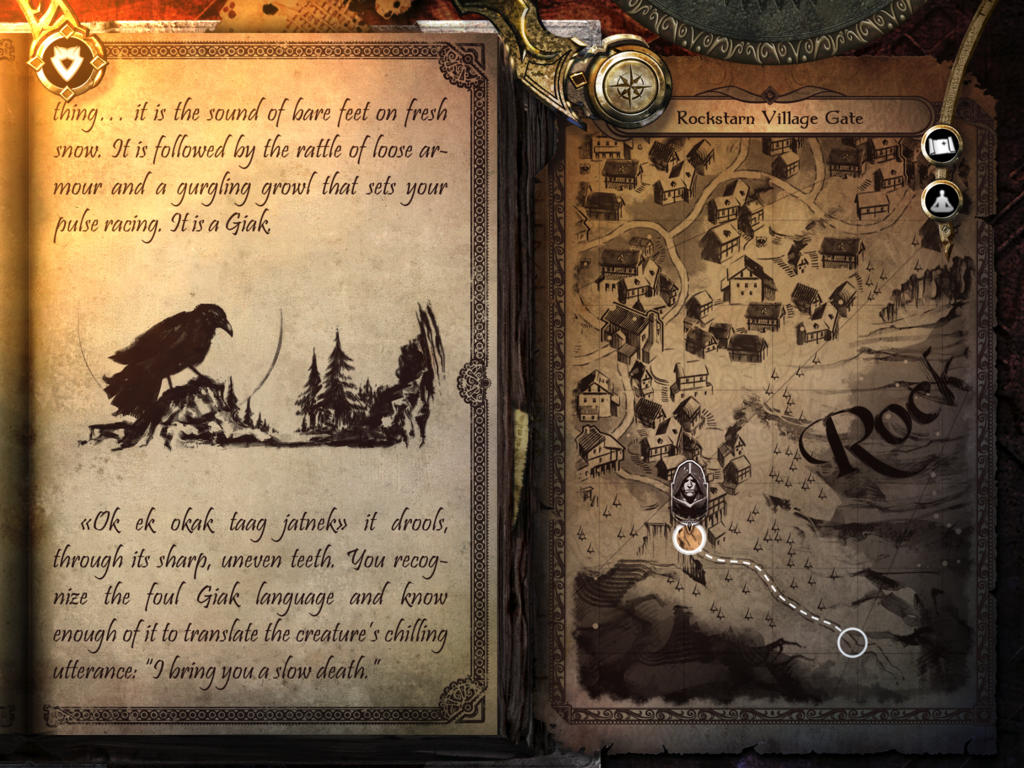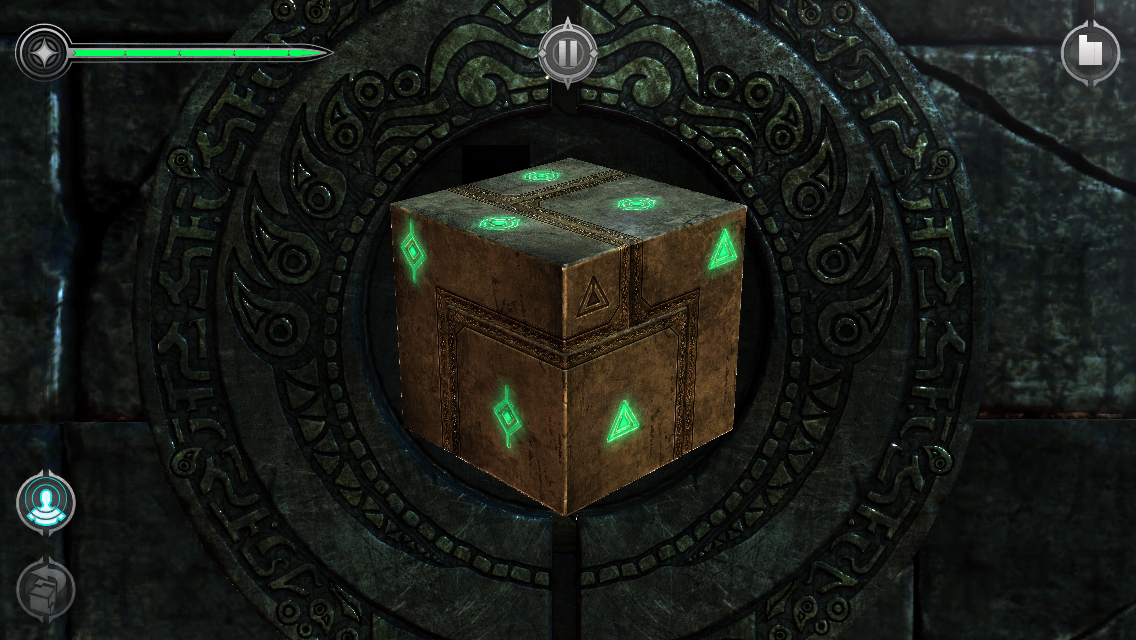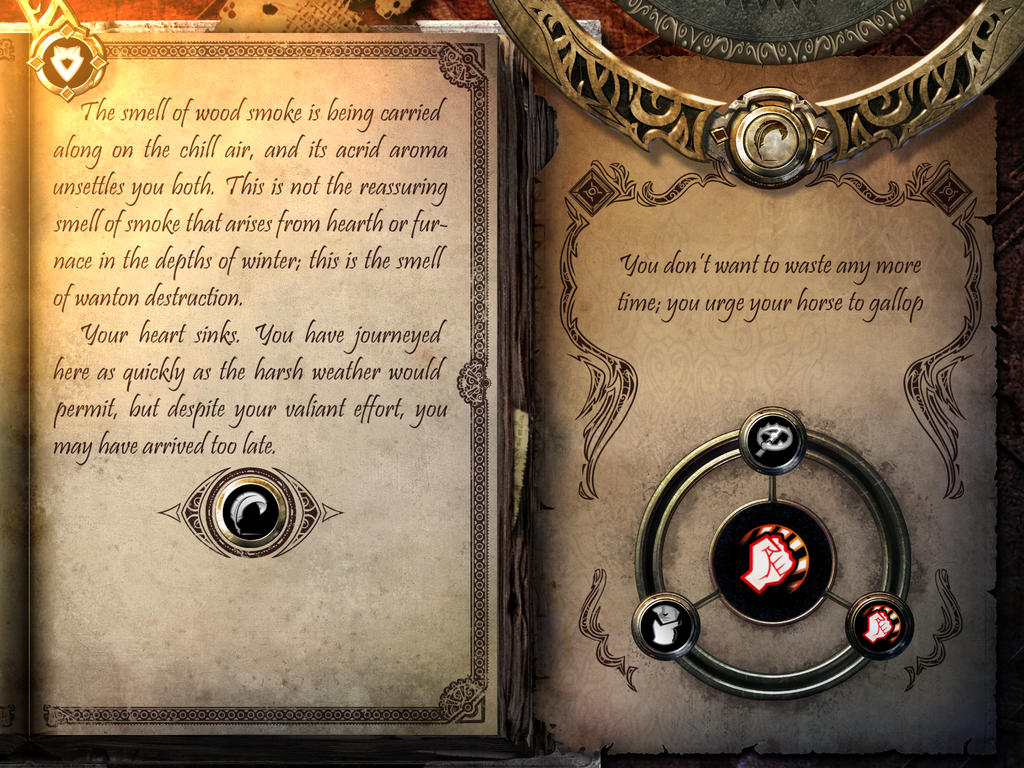 Hello, gentle readers, and welcome to the RPG Reload, the weekly feature where we do it all for Sommerlund and the Kai! Each week, we take a look at an RPG from the App Store’s past to see how it’s doing in the here and now. It’s a chance to revisit old favorites, reflect on their place in the overall library, or simply to take a deeper dive than our reviews typically allow. As one of the last remaining Kai Lords, I try to choose a balanced selection of games from week to week. If you feel I’m missing something important, however, you can let me know by posting in the comments below, stopping by the Official RPG Reload Club thread in the forums, or by tweeting me at @RPGReload. The schedule is planned well in advance, so I can’t promise you’ll see your suggestion soon, but I will add it to the master list.
Hello, gentle readers, and welcome to the RPG Reload, the weekly feature where we do it all for Sommerlund and the Kai! Each week, we take a look at an RPG from the App Store’s past to see how it’s doing in the here and now. It’s a chance to revisit old favorites, reflect on their place in the overall library, or simply to take a deeper dive than our reviews typically allow. As one of the last remaining Kai Lords, I try to choose a balanced selection of games from week to week. If you feel I’m missing something important, however, you can let me know by posting in the comments below, stopping by the Official RPG Reload Club thread in the forums, or by tweeting me at @RPGReload. The schedule is planned well in advance, so I can’t promise you’ll see your suggestion soon, but I will add it to the master list.
Scheduling which games will appear where far ahead of time is part of how I can make the Reload work. When a scheduled game disappears from the App Store before I can write it up, I have to consider what to do. I know some people like to play the games I cover here after reading about them, so I don’t think it’s a good habit to tease people with games they can’t get. Still, there have been a few cases where I’ve gone ahead with a scheduled game that is no longer available on the App Store. Zenonia disappeared literally a few days before my article went up, so it was too late to change anything. Chaos Rings 2 was a major release that I felt deserved an article, whether it was still for sale or not. The game I had planned to cover this week was Joe Dever’s Lone Wolf, and when I noticed it was gone, I started considering what else I could fill in its spot.
A couple of days later, I heard the news that Joe Dever, the creator of Lone Wolf and author of all of the gamebooks the character featured in, had passed away on the 29th of November, 2016. He was not very old, so I was quite shocked to hear this news. He had successfully battled kidney cancer back in 2005, but his recovery had gone surprisingly well. I know he had recently been working on finishing out the remaining Lone Wolf books and working on some other projects, so it never occurred to me that things could take a turn for the worse so quickly. We are now less one more legend, a man whose lifelong commitment to role-playing games in a variety of forms resulted in important contributions to the genre. Lone Wolf likely had many more adventures ahead of him in some form or another, and we are poorer for no longer having the chance to hear them.
So I’ve decided to proceed with this Reload of Joe Dever’s Lone Wolf out of respect for a true storyteller in the RPG genre. At least at the moment, you can’t get this game on iOS. I’m not sure why that is, as the game still plays fine on my devices. I had assumed it was an issue with mobile publisher Bulkypix, as they have been having some financial issues of late, but you can still buy the Android version they published, so that can’t be the case. At any rate, if you want to play the game, it’s still for sale on Android, PlayStation 4, Xbox One, and Steam. I’ve only played the iOS version, but I imagine the others will suit you just as well in a pinch.
I’ve already written an exhausting amount of words on Joe Dever’s Lone Wolf in my rolling review. I quite enjoyed doing a review like that, because I feel like reading it from start to finish, you get a strong sense of how much work developers Forge Reply put into improving the game through updates. I also made a somewhat brief reference to the gamebooks and their place in the history of the genre in RPG Reload Presents – The History of Handheld RPGs, Part One. But let’s expand a bit on that, shall we? I’ve got some thoughts on my replay of the game, but the mechanics are discussed extensively in the review, so I think we can skip over a full explanation here. Let’s instead take a look at the gamebook series and how it came about.
Joe Dever was born in the United Kingdom in 1956. Growing up in the 60s, he took an early interest in science fiction, a path that soon led him to fantasy, as well. His younger years were spent absorbing such works as Beowulf, Ivanhoe, and The Once and Future King. As he got older, he followed authors such as Tolkien, Michael Moorcock, and Mervyn Peake. It’s hardly surprising that he fell into the hobby of tabletop wargaming, which given the time period, naturally led him to Dungeons & Dragons. I suspect only a fraction of fantasy fans across all media today realize just how many fantasy tales came from campaigns of Dungeons & Dragons played by creative groups of friends. Dever had developed his world of Magnamund in 1975, but he started using it as a D&D campaign setting a couple of years later, which almost certainly helped him flesh it out. His interest and knowledge of Norse mythology and military history made for a fertile setting for adventures.
The funny thing about Lone Wolf, given its subsequent success in the gamebook category, is that it was originally intended to be a role-playing system, not a book series. Dever was originally going to release the system through Games Workshop, but some last minute negotiations with another publisher resulted in the game being transformed into a series of four gamebooks instead. The first two books released in the summer of 1984 and were an instant success. Gamebooks were riding high around this time, and Dever’s work was of excellent quality. The mechanics behind the books were deeper than most other contemporary gamebooks, and the use of a persistent main character across all of the books gave Lone Wolf a hook no one else offered at the time.
The series would eventually expand out to 28 books for its initial run, though Americans would only see the first 20 volumes for quite some time. The series was more popular in Europe, and the gamebook market in America had become quite tough by the mid-1990s thanks to the arrival of handheld gaming systems. There were also standard novelizations produced, along with a wealth of supplemental materials and even a few computer games. By 1998, even the European publisher of the series was ready to throw in the towel on the gamebook genre. Dever had planned to wrap the series up after volume 32, but unfortunately, the series was canceled after the 28th book. We finally got the 29th book, The Storms of Chai, earlier this year. That’s 18 years between volumes of a continuing story. And you thought waiting for The Last Guardian was hard! Unfortunately, with Mr. Dever’s passing, when, how, or if the remaining books will be published is up in the air.
I’d love to tell you a personal childhood story about my experiences with Lone Wolf, but the truth is, I knew little of this series before I played the iOS game. While I loved playing gamebooks in my younger years, I mostly stuck to Fighting Fantasy. I’m not sure if Lone Wolf wasn’t published in my neck of the woods or if I just didn’t notice it, but it was a complete unknown to me when I was assigned to review the game. And friends, you know me. I don’t like unknowns. I had the first few books shipped to me here in Japan so that I could get to know the series a little better. It wasn’t as cheap as I would have liked, but I think they were worth it. They’re very different from Fighting Fantasy, both in mechanics and flavor, and I’d recommend them to anyone who enjoys gamebooks. I didn’t know this at the time, but Joe Dever made almost all of the Lone Wolf books available freely in electronic form through Project Aon. Feel free to benefit from my experience. The first book can be found right here.
Previous video games based on Lone Wolf went for a more literal approach than Forge Reply’s efforts. The original books were adapted into electronic form, and I’m not sure if that was the best way to go given the technology of the 1980s. Now, as Tin Man has shown, iOS devices are quite capable of outstanding direct ports of gamebooks, and that’s certainly a route that Lone Wolf could have gone. But Forge Reply had a different idea in mind. Like inkle did with Sorcery!, Forge Reply wanted to bring the world of the books to life in a way that paper and ink couldn’t replicate. While most of Joe Dever’s Lone Wolf is played in a text format that mimics a gamebook, there are some parts of the story where very different things happen. Most strikingly, the battles are rendered in full polygonal graphics as turn-based RPG combat, complete with real-time elements like QTEs and a turn system similar to the Active Time Battle system from Final Fantasy.
The initial release of the app contained the first act of the story, and it was released on November 13th, 2013. The remaining three acts rolled out over the course of the next year. Besides adding to the story, each new update also brought a variety of improvements to the core mechanics and greater reasons to explore all of the options on offer. Perhaps appropriately, given the up-and-down difficulty of the Lone Wolf gamebooks, the difficulty balancing was extremely poor in the release version, but it mostly got sorted by the end. I felt the game started off pretty wobbly, so the fact that Forge Reply was able to correct it while pushing out content on a regular basis is incredible in hindsight. The final game has its share of flaws, but it turned out quite good on the whole. I wouldn’t have guessed that at the start.
With all the improvements in place, Joe Dever’s Lone Wolf is much better on a replay than it was on my initial playthrough. For one thing, I’m not spreading out the whole game over a calendar year. It’s easier to enjoy the story and the way the mechanics open up when you’re playing it as a complete game instead of consuming it piecemeal every few months. It’s also partly because I know exactly what I’m getting into now, so my expectations are aligned better. But most importantly, the developer made extensive improvements to the game as they went along, ensuring that players who started the game from the first act would have a much better experience than those who played it at launch.
Thus, I had a smooth and pleasant playthrough this time around. Yes, it’s still a whole lot of battles chained together by some very generic threads, but once you get the rhythm of the combat down, it will probably carry you through to the end of the game. Even at its worst, it’s hard not to respect the game for its creative approach to adapting a gamebook, and I think it’s enjoyable enough that gamebook and RPG fans will enjoy at least one playthrough. Beyond that, I suppose it will depend on how much joy you get out of being a medieval Batman, whipping out tricks and tools to take down far greater odds than any single man should be able to. I never tire of whipping a throwing dagger at a weakened foe to take them down just before ramming my Sommerswerd through the skull of their buddy. Your mileage on that may vary.
That’s just my take on Joe Dever’s Lone Wolf, though. What do you all think? Please share your thoughts on the game, the gamebooks, or anything else Lone Wolf or Joe Dever related. You can leave comments below, post in the Official RPG Reload Club thread, or tweet me at @RPGReload to let me know what’s on your mind. We’ll finally have a new episode of the RPG Reload Podcast up next week, and of course, I’ll be back with another RPG next Thursday. Thanks for reading!
Next Week’s Reload: Icewind Dale ($9.99)



